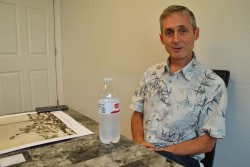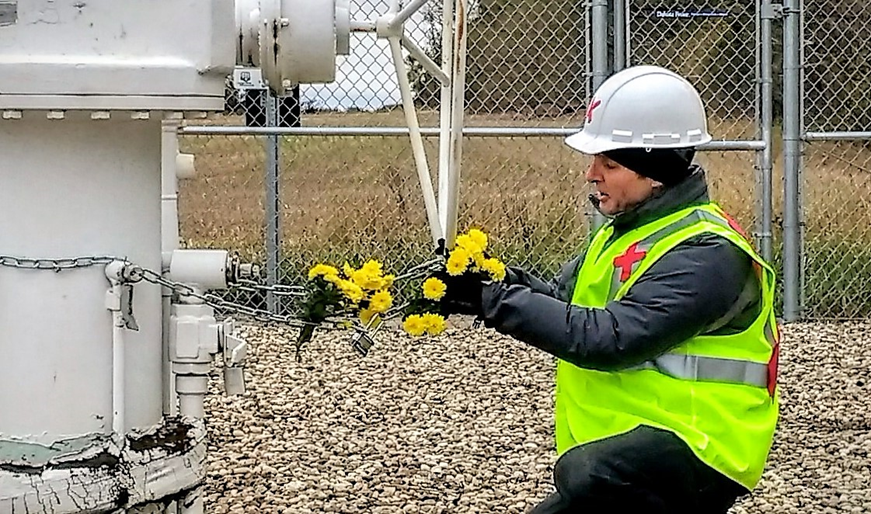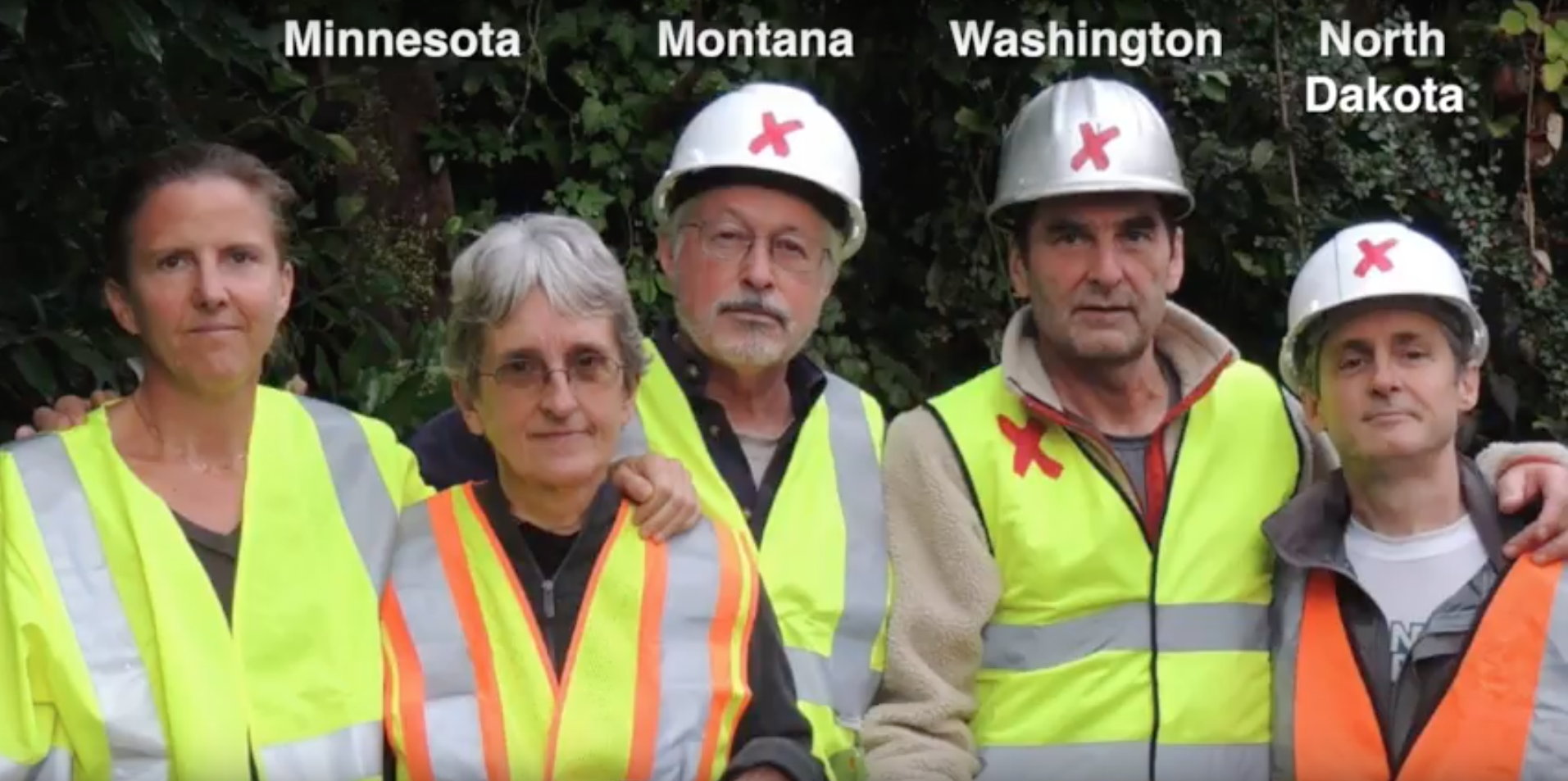News | August 23rd, 2017

CAVALIER, N.D. – He kept the plans secret for months. Not even family knew he planned to shut down North Dakota’s Keystone Pipeline. Chilled, early morning air stabbed his lungs as he stepped from the rental car and into a beet field, bolt cutters in one hand, yellow chrysanthemums in the other.
The pipeline’s emergency shut-off valve, a secluded area wrapped by a wire-link fence, was only a stone’s throw away from where he parked along a dirt road. He’d already scouted the area, had done his homework, but Michael Foster’s pulse quickened.
Finally, I get to do something real, shut down the Keystone 1 Pipeline. How quickly can law enforcement arrive? Can I get through the locks in time? Where is the valve? Will the valve be difficult to turn?
He had traveled grudgingly by plane nearly 1,500 miles from Seattle to become what is known as a valve turner. Foster had a vivid daydream that sheriff’s deputies would be waiting for him. Militarized police videos he’d seen from the standoff at Standing Rock were chilling enough. Surely his little group of environmental activists – white, middle class, middle-aged, and suburban – had committed mistakes, triggering algorithms.
Only the night before, on October 10, 2016, in a hotel pub, eating a plate of fries and ketchup, Foster couldn’t speak with comrades of his intentions for fear of being overheard, but now a live streamer and a filmmaker followed his every move, revealing him to the world as he committed felonies. But the internet signal was intermittent, keeping Sam Jessup’s live stream from broadcasting Foster’s initial moments.
I challenge this oil going through this pipeline. It’s illegal, and I have to stop it. Follow protocol: the pipeline companies were notified – twice – before Foster stepped up to the first barrier. Cameras were in place.
“We called the pipeline companies about 10 to 15 minutes before, to give them the opportunity to shut down remotely or do whatever they wanted to do,” Foster said. “The point wasn’t to do anything risky, the point was to do it procedurally, and respectfully, and stop the flow. Kind of the opposite of terrorism.”
The first lock snapped easily as a bicycle’s chain, he said. So did the second, which secured the valve, a four-foot-wide iron wheel.
“From then on I was in this euphoric moment, and was like ‘damn, I’m in the right moment at this right place in history,’” Foster said. “And there was fear, just because any time you are dealing with heavy machinery you have to be humble.”
The valve slid easily, righty-tighty lefty-loosey. Foster spun – fast – wanting to complete his mission before law enforcement arrived.
“At first it was easy,” Foster said. “And then it wasn’t. It started to get really tough by the time I was thinking I was done. I had been at it for awhile. I thought they had turned it down remotely.”
He gave the valve one more turn, then another for good measure. Then another, and then another. The wheel kept turning.
“He is the only one of us who actually turned off manually the pipeline,” Leonard Higgins, another valve turner who shut down a Montana pipeline the same day, said. Higgins’ target was automated, and he had more difficulty cutting the locks than he did with the valve. “Michael turned this huge wheel like a hundred times.”
Eventually, the valve could move no more. Foster locked it down with his own chain, and placed the flowers as a symbolic statement for the world to move to alternate energy. Job finished, he had time to think before law enforcement arrived. He was going to jail.
In a way, his trip to North Dakota had brought his environmental activism life full circle: he grew up where the pipelines end in the Gulf of Mexico, and now he was waiting for arrest where the crude oil from Canada entered the United States.
His awareness of environmental issues and global warming have taken their toll, and then some. His insistence on reducing the family’s carbon footprint has affected his life. He is no longer married, and currently unable to see his two children.
As a child, he barely knew his parents. His mother left, and his father was gunned down outside a Houston bar; mostly his grandparents, “mom and pop,” raised him. Foster, 52, spent 20 years as a mental health therapist before he volunteered to become a valve turner.
His thoughts turned to his children, and how much he loves them. Although he was educating youth across Puget Sound, his own children were no longer by his side.
“I was about to break the law to stop fossil fuels, something I told them not to do because it alienates people.” Foster remembered thinking. “Plus, I would never want them to go get arrested, but we’re out of time now. I needed to do something to stop the flow and burning of oil right away, or they’re toast.”
Currently, Foster is involved with Climate Direct Action and Al Gore’s initiative, the Climate Reality project. In the last five years, Foster has spoken to more than 13,000 people from behind pulpits to rallies about global warming issues. He is also a kayaktivist with the Mosquito Fleet Rapid Response Team, trying to delay oil rigs, ships, and pipelines, what he refers to as “monster death stars” for as long as possible.
The morning on October 11, 2016 was cloudy, cold. Shivers followed the euphoria of shutting down the pipeline.
“That wind was blowing. It was cold, I was glad when he showed up.”
Still amazed that the plan worked, Foster greeted the sheriff’s deputy when he arrived. The deputy nonchalantly rolled down the window, and asked what was going on.
“I guess we looked like what he expected to find,” Foster said. “We were white, and we were not doing anything when they arrived. We weren’t defending, we were just standing there, bolt cutters in hand, waiting. Kinda like in my dream, we came here to shut off the pipeline.”
Foster told him, showed him everything, retraced his steps, handing over the bolt cutters.
“We agreed ahead of time that we were going to share exactly what we had done and why,” Leonard Higgins said.
Handcuffs followed, and he was later charged with and arraigned on crimes that could lead to 81 years imprisonment. Jessup and documentary filmmaker Deia Schlosberg were arrested in Walhalla, North Dakota for shutting down Transcanada’s Keystone pipeline. Scholsberg was to spend 48 hours in solitary confinement because no other women were in lockup, Foster said.
“The state was pretty heavy-handed,” Foster said. “There were FBI agents there to just chat with me while I was sitting there in jail. But I couldn’t live with myself if I didn’t do this.” Foster recently returned to North Dakota for court proceedings.
“If I can think of something that can be done, and I don’t do it, I couldn’t live with myself. Whatever inconvenience I might face is nothing compared to the suffering or the vibrancy of the living world to come. There’s a world calling being made, there are voices, and creatures, and animals and plants, and people, I know they’re coming, just as sure as we have ancestors we have never met, just as we will have descendants we will never meet. I cannot be an observer.”
Foster later learned that the collective act of climate disobedience halted 15 percent of US oil consumption for the day. On October 13, 2016, oil stock prices dipped. The White House brought up oil pipeline infrastructure issues the next day.
Keystone employees called him and his comrades terrorists. The five activists were involved in the “most expansive, coordinated, takeover of fossil fuel infrastructure ever attempted in the USA,” according to Reuters.
“There’s years and years of living with this despair and being aware of these issues,” Foster said. “Whatever it is, there’s that sense of we have to do something.”
“And so we stopped all the tar sands from Canada to the US. I still look at my hands sometimes and say, ‘wow, I turned off the Keystone Pipeline.’”

Big Oil and the state’s response
While sitting in the lunchroom at Balkowtisch Enterprises, Inc., a medical product line distributor in Bismarck, Foster and Higgins recalled some of their greatest fears of shutting down the Keystone Pipeline.
With thousands of gallons of hot bitumen deleted with toxic chemicals pouring through the pipeline every minute, what if something went wrong? What if they couldn’t finish their missions before police arrived?
“When Transcanada called the sheriff, they called it a terrorist attack,” Foster said. “But they did not shut off the valve remotely. If that was your pipeline carrying 590,000 barrels of bitumen at 150 degrees F across the continent and you thought there was a terroristic attack on your pipeline, you should shut it down.”
“We were thinking that maybe they wouldn’t believe it, and that’s why we had people to live stream,” Higgins said.
Nothing did go wrong, however, except that nearly 2.3 million barrels of bitumen were stopped, for a time. All five pipes, two in Minnesota, one in Montana, one in North Dakota, and one in Washington, were shut down simultaneously.
In the Pembina County seat, Cavalier, Foster originally faced seven charges, which have been dropped to five, with a potential 23 years in prison, he said.
“I feel like I have already gotten 50 percent off,” Foster said. “We planned for the necessity defense, and the whole plan included staying out there until law enforcement arrived.”
A necessity defense is used to shield people who must break the law in order to prevent greater harm.
The five valve turners include Foster, Ken Ward, 59, of Corbette, Oregon, who was recently found technically guilty, but received no additional jail time in Skagit County Superior Court in Washington State. Foster’s day is coming on October 2, in Cavalier, North Dakota.
Other valve turners, Emily Johnston, 50, of Seattle, Washington, Annette Klapstein, 64, of Bainbridge Island, Washington, and Leonard Higgins, 64, of Eugene, Oregon, are still awaiting their court dates.
If the State’s Attorney throws the book at Foster, he’s ready, he said.
“Let them, I don’t get to choose that,” Foster said. “I got to choose whether to cut the chains, whether to turn off the flow of this poison. The court has to decide what justice looks like for me. But I am going to have the ability to tell them why I did what I did.”
Foster is no spy, he’s not a hero, he is just a middle-aged man trying to warn people about the future. After spending two days in jail, he’s grateful he has the chance to tell his story.
“I get to walk around telling this story, like I am some James Bond or Indiana Jones. I didn’t do squat, comparatively speaking, and the people who are paying the price are not me. I get all the benefits even when I mess up and draw down the wrath of the oil companies and the oil state, and they all want a piece of me, I still got all the benefits.”
He believes his chances of a not guilty verdict on October 2 aren’t good. Michael Hoffman, a Bismarck trial lawyer, is defending Foster. The nonprofit Climate Defense Project, three Harvard-trained attorneys, the Civil Liberties Defense Center, and the Climate Disobedience Center, are providing support.
“I’m going to try to prove to a jury of my farmer peers that what I did was not a crime because I was protecting their crops, was protecting their fields, and I was protecting their kids,” Foster said during a speech earlier this year. “I probably won’t win, but I’m going to do a heck of a job trying to convince them to open up that conversation, open up that door.”
Some call him an eco terrorist, but the title doesn’t faze him or Higgins.
“Really, for me my case is about proving the crime that took place that day, October 11, was when the oil company came and cut the lock off the valve that I put there and turned that oil back on,” Foster said. “That was a crime against humanity and nature.”
“The real terrorists are the people that are perpetrating this violence on the earth,” Higgins said.

August 16, 2017
The life of activism is full of dizzyingly short victories and long dry spells of defeats. When defeat hits home, Foster sleeps.
“Really, I sleep,” Foster said. “So what do I do about that? I just carry it with me, it fills my head. It distracts me. It keeps me awake. I try and write something; sometimes I manage something, sometimes I don’t. Call somebody, just in conversation find some friends and allies, and see if I can help them see things my way, that’s all I can do.”
Tension revolving around climate change issues is only worsening now with President Donald Trump in office.
“More people are joining the fight,” Higgins said. “That’s the opposite side of the same coin.”
“We’re working on a lot of false solutions,” Foster said. “And I’m having a tough time speaking out against it. A lot of people in the environmental movement put in a lot of time and hours into something that will be just a dead end. It’s a dead end.
“But I’m pretty far out there as far as policies and solutions, because I really am focused on getting the planet back to a stable climate.”
Shutting down the Canadian Keystone pipelines was the brainchild of Climate Direct Action, a nonprofit activist group founded by Foster, Higgins, and other like-minded people.
The decision stemmed from a question asked in the spring of 2016 of people involved with Climate Direct Action: would you be interested in having a conversation that would put you in danger of arrest?
“Everyone who got involved in this conversation was already 100 percent in, and once we got into the conversation, there were different levels. How much do you want to be involved? There were wonderful, long conversations where people could share their feelings and fears. Everyone was free to decide on how much they felt good about.”
“There was a larger discussion that was theoretical and then that discussion finished and the core group went forward,” Higgins said. “When the core group went forward, the others were involved in some way.”
For months, Foster feared that their little group of middle-aged men and women had somehow alerted authorities, and that their mission was doomed.
“There were some messages that were sent, some calls that were made that made us go ‘oops.’ I had a pretty strong feeling that the sheriffs were going to be waiting for us, here in North Dakota and everywhere. Somebody, somewhere, we tripped some algorithm and they’ll be waiting for us to show up.”
Foster has only one regret about shutting down the Keystone Pipeline.
“We wrestled with the idea that shutting off the pipeline is good because it stops X barrels of bitumen, then shutting off the pipeline X times would be that many more times better,” Foster said.
“I only wish I could have stopped more oil. This system is wrong, it’s a crime, it has to stop, and I’m here to stop it.
At times, Foster’s eyes water, his voice cracks not with sadness, but with conviction. Despite the upcoming trial he jokes. “I just wish I could have locked it with some kind of radioactive, kryptonite lock.
“When they removed my padlock to reopen the flow of tar sands oil to heat the planet, they committed a crime against humanity and nature as deadly as any gas chamber,” Foster said. “Every gallon of gasoline burned to drive our kids to school traps 40 million times more heat energy over the centuries. It’s a crime with a distinct fingerprint.
“Reopening that valve legally pulled the trigger on our kids 30 years from now.”
In states where the temperatures easily dip well below zero during the winter months, changing to alternative energy is not a simple matter, Foster said. “But if we can’t live the solution, we really have no right to talk,” he said.
“That’s a question I want all of us to wrestle with every single day,” Foster said. “If burning fossil fuels is a crime against humanity, why are we still doing this? Why should I be contributing to the demise of those I love in 2017? We need to resist this system.”
Downsizing, installing rocket stoves that burn wood, solar panels, and wind power are all viable options, he said. The earth needs one trillion trees, that’s 150 new trees planted by every person on earth.
While the planet begins to cook, some people say it’s over, we blew it, now let’s party, Foster said. Others turn a blind eye, kicking the problem for future generations.
“What does it mean to be alive on a planet that is dead man walking?” Foster said. “I don’t know how bad it has to get to force change. We need everybody doing everything all the time. It’s criminal not to take action today.”
Civilization has existed for 10,000 years, Foster said, the next 10,000 years depend on the human race today.
“One person cannot change the world.” Foster’s eyes twinkle. He folds his hands and leans closer. “But one person can change the world.”
January 27th 2026
January 27th 2026
January 26th 2026
January 24th 2026
January 16th 2026

__293px-wide.jpg)
_(1)__293px-wide.jpg)
_(1)_(1)_(1)_(1)_(1)__293px-wide.jpg)
_(1)_(1)_(1)_(1)_(1)__293px-wide.jpg)
